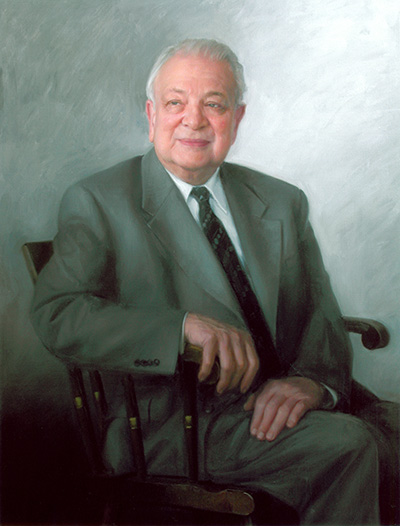Hugo Wolfgang Moser

Hugo Wolfgang Moser
- Artist:
- Stephen Craighead
- Date:
- 2003
- Medium:
- Oil on canvas
- Dimensions:
- 39.5 x 29.5 in.
Hugo Wolfgang Moser
1924-2007
Moser, a director of the Kennedy Krieger Institute and its Neurogenetics Research Center, was born in Bern, Switzerland. He grew up in Berlin but within a month of Hitler taking power in Germany, his family moved to the Netherlands, and later to Cuba and the United States, to escape the Nazis. Moser attended Harvard as an undergraduate student until he was drafted into the army. After discharge, he went to medical school at Columbia University, earning his degree in 1948.
After two years of residency at the Peter Bent Brigham Hospital, he volunteered for the Army, serving in the Korean War. He returned to Harvard to pursue advanced studies in biochemistry. After two years of course work, he became the first fellow of the National Multiple Sclerosis Society. From 1957 to 1959, he completed a residency in neurology at Massachusetts General Hospital. Beginning in 1959, he held faculty appointments at Harvard Medical School, and was appointed professor of neurology in 1972.
In 1976, Moser moved to Baltimore to become president of the Kennedy Krieger Institute and professor of neurology and pediatrics at the Johns Hopkins University School of Medicine. Moser was director for the Center on Research on Mental Retardation and Related Aspects of Human Development at the institute from 1976 to 1988, and director of its Neurogenetics Research Center from 1995 until his death. He was a prominent advocate for people with mental and developmental disabilities.
Following his extensive training in the field of neurology, Moser began researching brain lipids. With the guidance of his mentors in the field, he became interested in leukodystrophies.
As a neurologist specializing in genetic disorders that involve the part of the cell called the peroxisome, Moser helped to identify the characteristic biochemical abnormalities and the gene mutations that cause each of the fifteen peroxisomal disorders. However, he is best known for his work in the most common of these disorders, adrenoleukodystrophy (ALD). Moser established methods of early diagnosis, counseling, and world-wide programs to evaluate methods of therapy, including diet, pharmacological agents, and transplantation. In 1981, Moser and his wife Ann developed a blood test to diagnose ALD, subsequently identifying more than a thousand children and adults with the disease. The test is now used routinely for detecting ALD through prenatal diagnosis.
One of Moser’s longest endeavors involved the development of Lorenzo’s oil. It began with his relationship with Augusto and Michaela Odone, the parents of Lorenzo Odone, whom Moser had diagnosed with ALD. Moser’s research team had discovered that boys with ALD were unable to degrade certain fatty acids. As Lorenzo Odone declined, Moser suggested using immunosuppression, which was unsuccessful. Together with scientist Bill Rizzo and the boy’s father, Moser developed “Lorenzo’s oil,” a mixture of olive and rapeseed oils, that when combined with a special diet can reduce the amount of abnormal fatty acids in the body that cause myelin degradation. While it cannot repair damage already done in boys who are symptomatic, it can prevent the disease from progressing into a degenerative state in presymptomatic boys. The work was chronicled in the movie Lorenzo’s Oil.
Moser remained extremely active throughout the ALD community until the end of his life, serving on the boards of the United Leukodystrophy Foundation, The Myelin Project and the Montel Williams MS Foundation. He also participated in many professional societies and editorial boards, and was on the Board of Directors of the International Child Neurology Society. His many accomplishments earned him wide international recognition, and numerous honors and awards, including his October 2006 election to the rank of fellow of the American Association for the Advancement of Science, honoring his pioneering work in the field of developmental neurogenetics.
"*" indicates required fields
